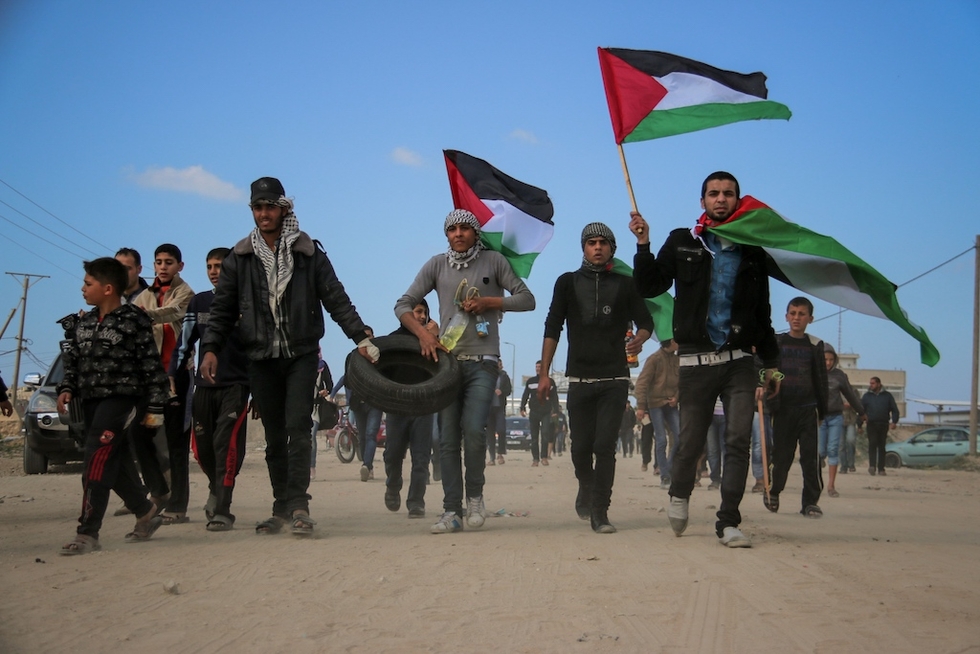Gaza's Great March of Return: Coming together to end a dark era of injustice

The Great March of Return has reached its first anniversary. On Friday, thousands of Palestinian men, women and children from all political backgrounds marched, as we have done every Friday - but one year on, we are no closer to seeing Israel lift its illegal 12-year blockade on Gaza.
This densely populated strip of land, surrounded by Israeli barriers, has long been a prison to the Palestinian people who inhabit it.
Look east and you see the fence, brimming with rifles and soldiers ready to execute any Palestinian who steps too close. Look west and you see Israeli military boats, a menacing form along the Mediterranean coast, prohibiting all entrance or exit - all this, despite Israel's claim that it withdrew from Gaza in 2005.
Awakening the behemoth
When I first called for the Great March of Return last year, I could never have anticipated the slumbering behemoth that I awoke.
New MEE newsletter: Jerusalem Dispatch
Sign up to get the latest insights and analysis on Israel-Palestine, alongside Turkey Unpacked and other MEE newsletters
In the three months that preceded the march, Palestinians with different ideologies and political opinions were filled with motivation and hope. Civil society activists, youth groups, writers, artists, women's rights associations and journalists expressed to me their absolute support for this peaceful alternative. Even members of armed factions were able to get behind it.
They shot medics, journalists and even the disabled in this unprecedented violation of international human rights and humanitarian law
What started as a Facebook post turned into a historic movement, giving Israel an unprecedented opportunity: It could encourage Palestinians to adopt peaceful resistance, through words and culture, rather than guns and violence. But instead, Israel turned to violence.
On 30 March, 2018, Israeli soldiers killed peaceful demonstrators who posed no threat. Snipers sat in military towers safe from the fight, wilfully shooting and killing women and children. They shot medics, journalists and even the disabled in this unprecedented violation of international human rights and humanitarian law.
These were avoidable deaths. They did not come as response to a physical threat posed by the Palestinian people, but from a desire to kill the very idea that these peaceful demonstrators represented. As the old adage goes, it's easier to kill a man than an idea.
Undeniable right of return
For Israel, the Palestinian "problem" is a concept more easily sold to the international community when Palestinians are labelled as violent and armed. The reality, however, is that the Great March of Return represents the peaceful faces of the men, women, children and elderly residents of Gaza.
The significance of the march cannot be understated. It is symbolic of the intent of the Palestinian people to peacefully continue to fight for our undeniable right of return. It sends a message that millions of refugees, spread around the globe, must return home. This is their right; it must no longer be treated as an academic exercise or a theoretical question. It is practically achievable and must be treated as such.
The vast majority of the land on which refugees lived before Israel expelled them in 1948 is either still empty or has a low population density. With the right political will, we would be able to end the tragedy that has engulfed millions of Palestinian refugees, and ensure a peaceful existence alongside their Jewish neighbours.
We want a solution based on the foundations of justice, equality and freedom. This means a country where indigenous Palestinians can coexist with their Jewish neighbours according to the shared values of citizenship, equal rights and international justice - not a state "only of the Jewish people," as Prime Minister Benjamin Netanyahu contends, but one that we can share together.
Redefining the Palestinian-Israeli relationship
What is certain is that the current situation is unsustainable. When Israel expelled the Palestinians in 1948, it hoped they would resettle in their destination countries and quickly forget their homeland. But today, 70 years after being expelled, millions of Palestinian refugees still yearn for a homeland long denied to them.
The right of return is more than a political statement: it is ingrained in the very nature of what it means to be Palestinian, rooted in Palestinian culture, literature and the minds of refugees residing in camps and foreign countries around the globe.
It exists in artistic works, on the names of stores and buildings, and in oral memory - and this is what the Great March of Return represents. This is a right that cannot be forgotten or questioned.
Fear exists about the right of return, but fear comes from injustice. A solution exists, but we must redefine the Palestinian-Israeli relationship on the basis of human equality, rather than expulsion and racial discrimination. We must accept a coexistence founded on the joint principles of humanity, rather than occupation and hate.
Let us come together to end this dark era of injustice and suffering, and put in place the basis for peace and stability, built on the recognition of the right of all peoples to freedom, equality and return.
The views expressed in this article belong to the author and do not necessarily reflect the editorial policy of Middle East Eye.
Middle East Eye delivers independent and unrivalled coverage and analysis of the Middle East, North Africa and beyond. To learn more about republishing this content and the associated fees, please fill out this form. More about MEE can be found here.







